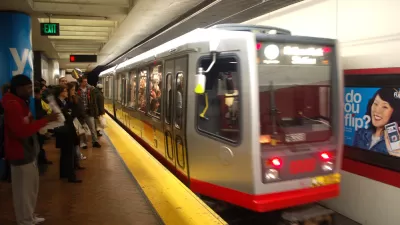Although the landmark but now controversial environmental law, the CA Environmental Quality Act (CEQA) is state law, it is implemented by the 'lead agency' of a project which can be a city. S.F. Supervisor Scott Wiener hopes to reform that process.
In the 'City Insider' (a compilation of local stories in the San Francisco Chronicle), John Wildermuth describes how a proposal by a San Francisco supervisor "to streamline San Francisco's environmental appeals process" was received by the public at a Planning Commission meeting.
Supervisor Weiner "knew he was toying with a political third rail." At least he was prepared.....
"Today you'll hear quite a bit of hyperbolic rhetoric about how this legislation somehow undermines or guts (the California Environmental Quality Act) and how it will cause the sky to collapse onto the earth."
"For more than 90 minutes, people lined up to slam Wiener and his proposal."
While the planning commissioners were more polite, they "asked the supervisor to come back to them with a new, improved version of his proposed legislation."
"Many of the complaints left Wiener shaking his head, especially because the city can't touch the basic provisions of the state's landmark environmental law."
Wiener "knows his plan to tighten some of the deadlines for environmental appeals, limit the number of appeals that can be filed on a single project and allow some appeals to be heard by board committees rather than the full Board of Supervisors will make plenty of people unhappy."
"CEQA exists to ensure proper analysis of environmental impacts," he said. "It does not exist as a tool to delay projects."
On a related note, California columnist Tom Elias opined Dec. 3 on what he sees are inevitable attempts by Sacramento legislators and Gov. Jerry Brown to streamline the law that environmentalists hold in such high regard.
"No governor since CEQA passed has seemed more receptive to loosening its requirements than Jerry Brown.
Among the alteration attempts likely to return next year is an exclusion from CEQA for projects that already comply with local land-use plans previously certified as consistent with CEQA.
Brown’s turnaround on this law stems from his experience as mayor of Oakland from 1999 to 2007, when several projects aimed at bettering blighted areas were stymied by challenges under CEQA."
Contributor's note: Scroll down to second article in 'City Insider', "Sensitive subject" for CEQA article.
FULL STORY: City Insider: Sensitive subject

Maui's Vacation Rental Debate Turns Ugly
Verbal attacks, misinformation campaigns and fistfights plague a high-stakes debate to convert thousands of vacation rentals into long-term housing.

Planetizen Federal Action Tracker
A weekly monitor of how Trump’s orders and actions are impacting planners and planning in America.

In Urban Planning, AI Prompting Could be the New Design Thinking
Creativity has long been key to great urban design. What if we see AI as our new creative partner?

King County Supportive Housing Program Offers Hope for Unhoused Residents
The county is taking a ‘Housing First’ approach that prioritizes getting people into housing, then offering wraparound supportive services.

Researchers Use AI to Get Clearer Picture of US Housing
Analysts are using artificial intelligence to supercharge their research by allowing them to comb through data faster. Though these AI tools can be error prone, they save time and housing researchers are optimistic about the future.

Making Shared Micromobility More Inclusive
Cities and shared mobility system operators can do more to include people with disabilities in planning and operations, per a new report.
Urban Design for Planners 1: Software Tools
This six-course series explores essential urban design concepts using open source software and equips planners with the tools they need to participate fully in the urban design process.
Planning for Universal Design
Learn the tools for implementing Universal Design in planning regulations.
planning NEXT
Appalachian Highlands Housing Partners
Mpact (founded as Rail~Volution)
City of Camden Redevelopment Agency
City of Astoria
City of Portland
City of Laramie





























